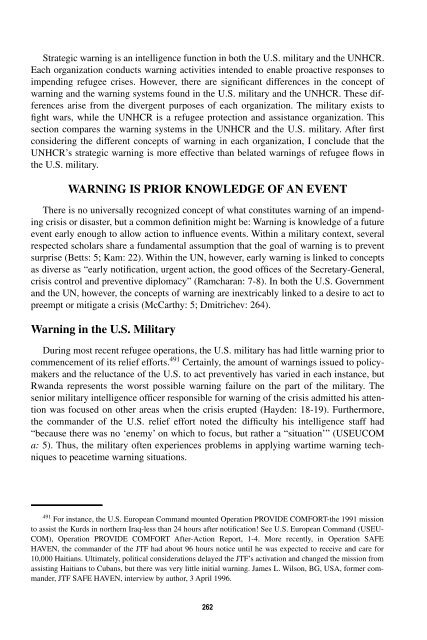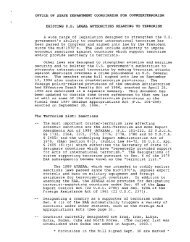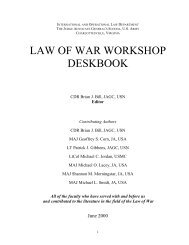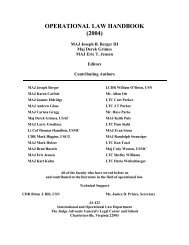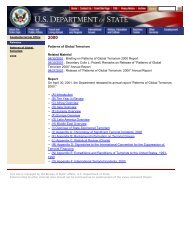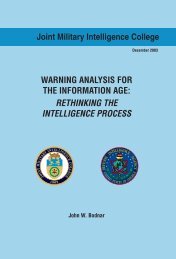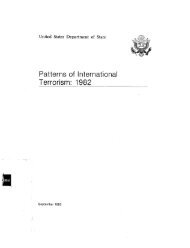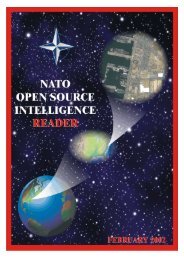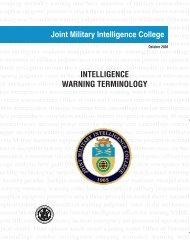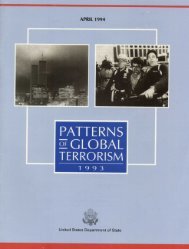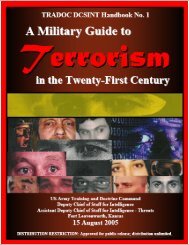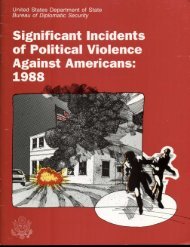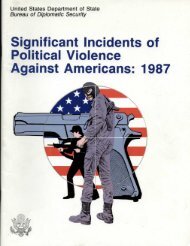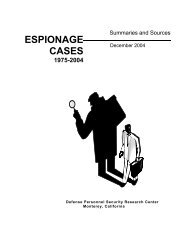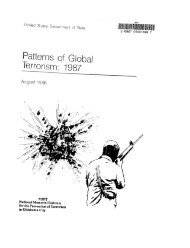learning with professionals - Higgins Counterterrorism Research ...
learning with professionals - Higgins Counterterrorism Research ...
learning with professionals - Higgins Counterterrorism Research ...
You also want an ePaper? Increase the reach of your titles
YUMPU automatically turns print PDFs into web optimized ePapers that Google loves.
Strategic warning is an intelligence function in both the U.S. military and the UNHCR.<br />
Each organization conducts warning activities intended to enable proactive responses to<br />
impending refugee crises. However, there are significant differences in the concept of<br />
warning and the warning systems found in the U.S. military and the UNHCR. These differences<br />
arise from the divergent purposes of each organization. The military exists to<br />
fight wars, while the UNHCR is a refugee protection and assistance organization. This<br />
section compares the warning systems in the UNHCR and the U.S. military. After first<br />
considering the different concepts of warning in each organization, I conclude that the<br />
UNHCR’s strategic warning is more effective than belated warnings of refugee flows in<br />
the U.S. military.<br />
WARNING IS PRIOR KNOWLEDGE OF AN EVENT<br />
There is no universally recognized concept of what constitutes warning of an impending<br />
crisis or disaster, but a common definition might be: Warning is knowledge of a future<br />
event early enough to allow action to influence events. Within a military context, several<br />
respected scholars share a fundamental assumption that the goal of warning is to prevent<br />
surprise (Betts: 5; Kam: 22). Within the UN, however, early warning is linked to concepts<br />
as diverse as “early notification, urgent action, the good offices of the Secretary-General,<br />
crisis control and preventive diplomacy” (Ramcharan: 7-8). In both the U.S. Government<br />
and the UN, however, the concepts of warning are inextricably linked to a desire to act to<br />
preempt or mitigate a crisis (McCarthy: 5; Dmitrichev: 264).<br />
Warning in the U.S. Military<br />
During most recent refugee operations, the U.S. military has had little warning prior to<br />
commencement of its relief efforts. 491 Certainly, the amount of warnings issued to policymakers<br />
and the reluctance of the U.S. to act preventively has varied in each instance, but<br />
Rwanda represents the worst possible warning failure on the part of the military. The<br />
senior military intelligence officer responsible for warning of the crisis admitted his attention<br />
was focused on other areas when the crisis erupted (Hayden: 18-19). Furthermore,<br />
the commander of the U.S. relief effort noted the difficulty his intelligence staff had<br />
“because there was no ‘enemy’ on which to focus, but rather a “situation’” (USEUCOM<br />
a: 5). Thus, the military often experiences problems in applying wartime warning techniques<br />
to peacetime warning situations.<br />
491 For instance, the U.S. European Command mounted Operation PROVIDE COMFORT-the 1991 mission<br />
to assist the Kurds in northern Iraq-less than 24 hours after notification! See U.S. European Command (USEU-<br />
COM), Operation PROVIDE COMFORT After-Action Report, 1-4. More recently, in Operation SAFE<br />
HAVEN, the commander of the JTF had about 96 hours notice until he was expected to receive and care for<br />
10,000 Haitians. Ultimately, political considerations delayed the JTF’s activation and changed the mission from<br />
assisting Haitians to Cubans, but there was very little initial warning. James L. Wilson, BG, USA, former commander,<br />
JTF SAFE HAVEN, interview by author, 3 April 1996.<br />
262


